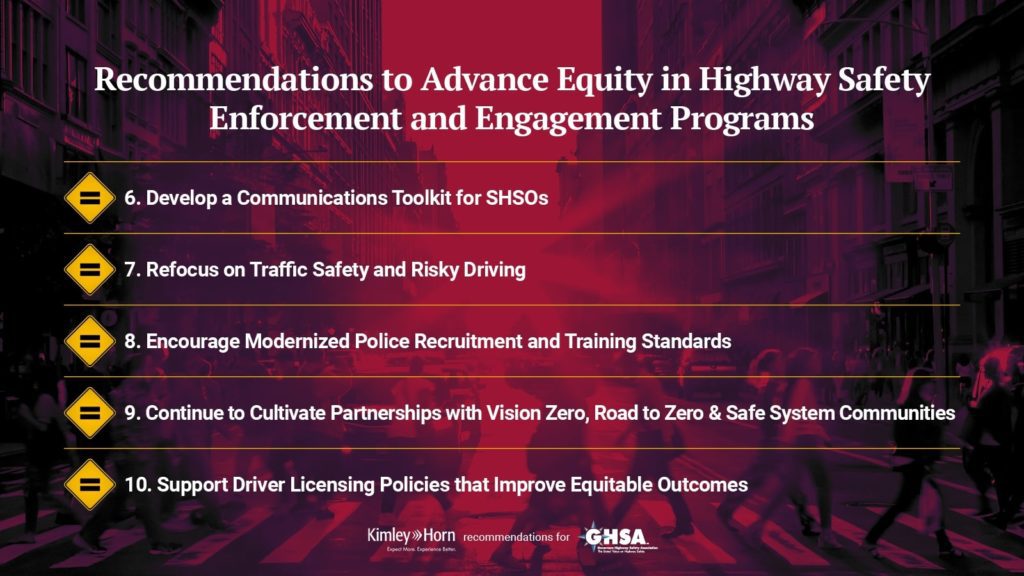The Governors Highway Safety Association (GHSA)’s new report includes 10 recommendations developed by consulting firm Kimley-Horn for the association, State Highway Safety Offices (SHSOs) and their partners, and the traffic safety community to support more equitable outcomes for Black, Indigenous and People of Color (BIPOC).
Kimley-Horn developed the recommendations after a thorough review of national best practices, interviews with SHSO leaders to examine current practices, and conversations with key GHSA safety partners. The recommendations are intended to help broaden the reach of the nation’s highway safety programs by eliminating racial disparities in traffic safety engagement and enforcement.
- Download Equity in Highway Safety Enforcement and Engagement Programs
- News Release: GHSA Releases Independent Recommendations to Advance Equity in Traffic Safety Programs
- Additional information on equity in traffic safety
The recommendations include (also pictured below):
- Promote the collection and analysis of racial data for every traffic stop to better understand potential disparities and allocate funding toward more effective enforcement.
- Support increased funding for racial profiling data collection to allow more states to collect and analyze data that can be used to identify and implement solutions to address disparities.
- Support increased use of automated enforcement, which studies confirm can substantially reduce risky driving behaviors and be applied equitably with community engagement.
- Establish a promising practices guide for SHSOs that identifies opportunities to increase BIPOC participation in highway safety programs.
- Encourage broader community involvement in the highway safety planning process so diverse communities have a voice in shaping enforcement and other strategies that can help reduce racial inequities.
- Develop a communications toolkit for SHSOs that identifies key strategies for mitigating disparities and reinforces the message that everyone has a role to play in ensuring traffic enforcement and safety programs are equitable.
- Refocus traffic enforcement efforts on traffic safety and prioritize the most dangerous and unlawful driving behaviors, such as speeding and driving under the influence, that put all road users at risk.
- Encourage modernized police recruitment and training standards to achieve more equitable enforcement outcomes and law enforcement agency demographics that more closely align with the communities they serve.
- Continue to cultivate partnerships with Vision Zero, Road to Zero, and Safe System communities to promote a holistic and collaborative approach to highway safety that leverages all available safety tools.
- Support driver licensing policies that improve equitable outcomes such as ensuring that license sanctions are limited to moving violations and exploring more flexible fee and payment structures for traffic citations, driver license fees, and vehicle registration.



